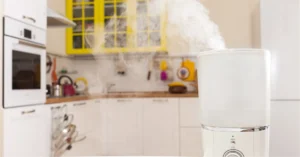All air purifiers do not emit ozone, and understanding the health risks is crucial. Ozone emissions differ among air purifiers and can have potential health effects.
Clean air is essential for good health, and many people turn to air purifiers to improve indoor air quality. However, it is important to know if air purifiers emit ozone, as this gas can have harmful effects on the respiratory system.
Ozone, a form of oxygen, is a major component of smog and can be generated when certain air purifiers use ionization or ozone-generating technologies. Prolonged exposure to ozone can lead to various health problems such as coughing, throat irritation, shortness of breath, and even lung damage. Therefore, understanding the potential health risks associated with ozone emissions from air purifiers is crucial in order to make informed decisions about indoor air quality.

Credit: www.amazon.com
The Truth About Ozone And Air Purifiers
Ozone emission from air purifiers is a topic of concern when it comes to maintaining indoor air quality. While it is true that some air purifiers do emit ozone, not all of them do. It is important to understand the health risks associated with ozone exposure and make an informed decision before purchasing an air purifier.
Ozone, a reactive gas composed of three oxygen molecules, can cause respiratory health issues when present in high concentrations. Prolonged exposure to ozone can irritate the respiratory system, leading to coughing, wheezing, throat irritation, and chest pain. Individuals with pre-existing respiratory conditions, such as asthma or chronic obstructive pulmonary disease (COPD), are particularly vulnerable to the adverse effects of ozone.
There is a common misconception that all air purifiers produce ozone. While some air purifiers, particularly those using ionization or ozone generators, do emit ozone as a byproduct of their purification process, many others do not. HEPA-based air purifiers, for instance, do not generate ozone and are considered safe for use.
| Health concerns associated with ozone emission | The impact of ozone on respiratory health | Common misconceptions about ozone production in air purifiers |
|---|---|---|
| Prolonged exposure to ozone can cause respiratory issues | Ozone can irritate the respiratory system | Not all air purifiers emit ozone |
| Individuals with pre-existing respiratory conditions are more vulnerable | Ozone exposure can lead to coughing, wheezing, and throat irritation | HEPA-based air purifiers do not generate ozone |
Factors Contributing To Ozone Emission
There are several factors that contribute to ozone emission in air purifiers. One of the key factors is the type of air purifier being used. Some air purifiers, such as ozone generators, are specifically designed to produce ozone as part of the air purification process. These devices work by generating ozone molecules that react with common airborne pollutants, effectively neutralizing them. However, the ozone emitted by ozone generators can be harmful to human health in high concentrations.
In contrast, most other types of air purifiers, such as HEPA filters and activated carbon filters, do not produce ozone as a by-product. They rely on physical filtration or adsorption techniques to capture and remove particles, allergens, and odors from the air. These air purifiers are considered safer for indoor use, as they do not contribute to ozone levels in the environment.
It is important to note that even air purifiers without ozone generating capabilities may produce trace amounts of ozone due to the electrostatic or ionizing effects of their filtration systems. However, these levels are typically minimal and pose little risk to health.
The Health Risks Of Ozone Exposure
Short-term effects on respiratory health: Ozone exposure can have immediate impacts on our respiratory system. It can cause irritation, inflammation, and exacerbate existing respiratory conditions such as asthma or bronchitis. People exposed to high levels of ozone may experience chest tightness, coughing, wheezing, and shortness of breath. These symptoms can be particularly severe in individuals with pre-existing respiratory issues.
Long-term consequences of sustained ozone exposure: Prolonged exposure to ozone can lead to more serious health problems in the long run. Studies have shown that chronic exposure to high ozone levels may result in reduced lung function, increased frequency of respiratory infections, and the development and progression of chronic respiratory diseases.
Vulnerable populations at higher risk of ozone-related health issues: Certain groups are more susceptible to the negative effects of ozone exposure. This includes children, older adults, individuals with asthma or other respiratory conditions, and people who engage in outdoor activities or work in industries with high levels of ozone pollution.
Children And Ozone Exposure
Children and Ozone Exposure
The developing lungs of children make them more susceptible to the harmful effects of ozone. Ozone exposure can have a significant impact on children’s respiratory health. Studies have shown that prolonged exposure to ozone may lead to the development or exacerbation of respiratory conditions such as asthma and bronchitis in children. Additionally, children who are exposed to high levels of ozone may experience increased coughing, wheezing, and shortness of breath.
Potential impact of ozone exposure on children’s respiratory health
Exposure to ozone can cause inflammation in the airways and reduce lung function in children. Ozone can also increase the risk of respiratory infections and trigger asthma attacks in susceptible individuals. It is important for parents and caretakers to be aware of the potential health risks associated with ozone exposure and take necessary precautions to protect children.
Precautions to minimize ozone exposure in children:
| Precautions | Description |
|---|---|
| Avoid outdoor activities during peak ozone hours | Ozone levels are highest during mid-afternoon to early evening. Limiting outdoor activities during these hours can help reduce exposure. |
| Keep windows closed | Keeping windows closed can prevent outdoor ozone from entering the indoor environment. |
| Use air purifiers with low ozone emission | Choose air purifiers that have been certified to emit low levels of ozone. Look for products with HEPA filters, which effectively capture particles without producing ozone. |
Asthma And Ozone Exposure
It is a common concern for individuals with asthma whether air purifiers can emit ozone and potentially worsen their symptoms. Ozone, a highly reactive gas, can be emitted by certain types of air purifiers, particularly those that use ionizers or ozone generators.
The relationship between asthma and ozone exposure is well-documented. Studies have shown that exposure to ozone can trigger asthma symptoms, increase airway inflammation, and worsen lung function. People with asthma are more sensitive to the effects of ozone, making it essential for them to be cautious when selecting an air purifier.
When choosing an air purifier, individuals with asthma should opt for models that do not emit ozone. Look for air purifiers that are certified as “ozone-free” or have been tested and proven to emit minimal amounts of ozone. Additionally, it is recommended to select an air purifier with a HEPA filter, which can effectively capture allergens and irritants, providing cleaner air for individuals with asthma.
| Effects of Ozone on Asthma Symptoms and Severity | Recommendations for Individuals with Asthma Using Air Purifiers |
|---|---|
| – Ozone exposure can trigger asthma symptoms | – Choose air purifiers that do not emit ozone |
| – Ozone worsens airway inflammation in asthma | – Look for certifications like “ozone-free” |
| – Ozone can decrease lung function in asthma | – Opt for air purifiers with HEPA filters |
Ozone And Allergies
Ozone is a highly reactive gas, and its effects on individuals with allergies can be significant. Those who already suffer from respiratory conditions, such as asthma or allergies, may find that exposure to ozone can worsen their symptoms. Ozone can irritate the respiratory system, leading to coughing, wheezing, and shortness of breath. It can also trigger allergic reactions in individuals who are sensitive to ozone.
When selecting an air purifier for individuals with allergies, it is important to choose one that is safe and does not emit ozone. Look for air purifiers that use filters, such as HEPA filters, to capture and remove allergens from the air. These types of filters are effective at trapping particles as small as 0.3 microns, including pollen, dust mites, and pet dander.
| What to Look for in Air Purifiers Safe for Allergies: |
|---|
| HEPA filters with a high efficiency rating |
| Activated carbon filters to remove odors and chemicals |
| Air purifiers with a strong airflow rating |
| Quiet operation to avoid disruptions |
| Low maintenance requirements |
By choosing an air purifier that does not emit ozone and has effective filtration methods, individuals with allergies can create a cleaner and safer environment for themselves, reducing the risk of triggering allergic reactions and sensitivities.
Minimizing Ozone Emission From Air Purifiers
Many people are concerned about the potential health risks associated with air purifiers and their emission of ozone. It is important to note that not all air purifiers emit ozone. Choosing air purifiers with low or no ozone production can help minimize the risks. When selecting an air purifier, it is crucial to understand ozone emission ratings and certifications. Look for products that have been tested and certified to meet specific ozone emission standards. Understanding ozone emission ratings and certifications can provide assurance that the air purifier you choose is safe to use.
In addition to selecting the right air purifier, there are several best practices for using air purifiers while minimizing ozone exposure. For instance, it is recommended to keep the air purifier in a well-ventilated area and to monitor ozone levels regularly. It is also important to follow the manufacturer’s instructions for proper maintenance and filter replacements.
By following these guidelines and staying informed about ozone emissions from air purifiers, you can make educated choices to protect your health while enjoying the benefits of cleaner indoor air.
Frequently Asked Questions(FAQ)
Are There Any Air Purifiers That Do Not Emit Ozone?
Yes, there are air purifiers available that do not emit ozone. These purifiers are designed to filter out airborne pollutants without producing ozone as a byproduct.
Do All Air Purifiers Generate Ozone?
Not all air purifiers generate ozone. Some air purifiers use technologies like activated carbon or HEPA filters that do not produce ozone. It’s important to check the specifications of an air purifier before purchasing to ensure it does not generate ozone.
How Do I Know If My Air Purifier Produces Ozone?
Check the product specifications or manual for information on ozone production. Look for ozone-reducing features like HEPA filters or activated carbon filters. If there is still doubt, contact the manufacturer directly for clarification. Avoid air purifiers that do produce ozone, especially if you have respiratory issues.
Do Air Purifiers With Hepa Filters Emit Ozone?
No, air purifiers with HEPA filters do not emit ozone. HEPA filters are designed to capture microscopic particles without releasing harmful gases or ozone into the air. This ensures cleaner and healthier indoor air quality.
Conclusion
Understanding the potential health risks associated with air purifiers is essential. While not all air purifiers emit ozone, it’s crucial to carefully evaluate the specifications of any device before purchasing. By selecting a low or no ozone-emitting air purifier, individuals can effectively improve indoor air quality without compromising their health.
Prioritizing the safety of oneself and loved ones is crucial in maintaining a healthy living environment.




